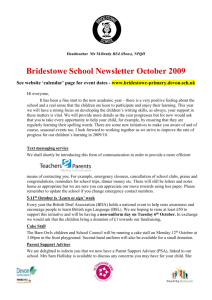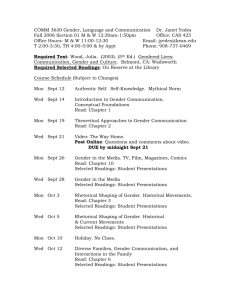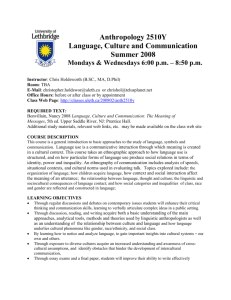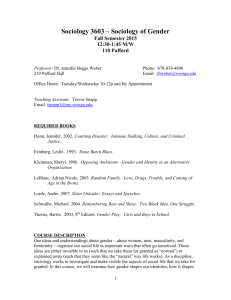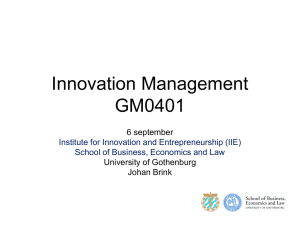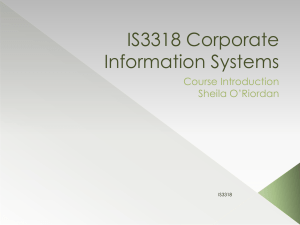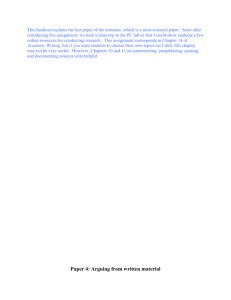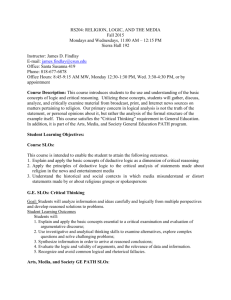AMS 237 Nan Wolverton Fall 2014 American Studies Smith College
advertisement
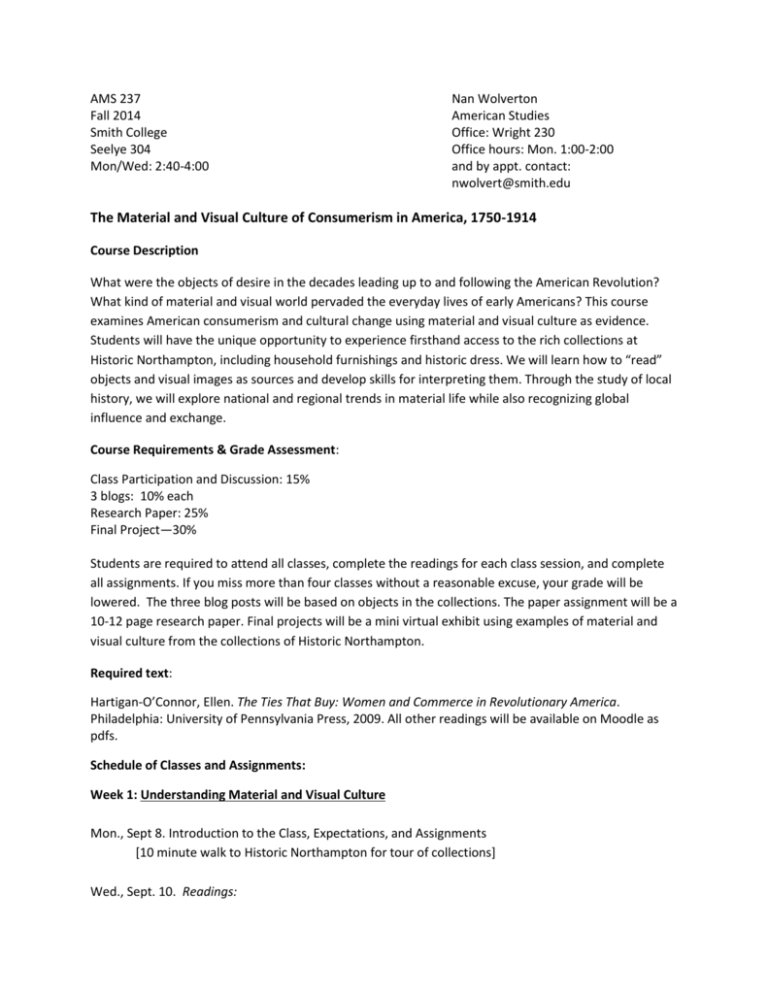
AMS 237 Fall 2014 Smith College Seelye 304 Mon/Wed: 2:40-4:00 Nan Wolverton American Studies Office: Wright 230 Office hours: Mon. 1:00-2:00 and by appt. contact: nwolvert@smith.edu The Material and Visual Culture of Consumerism in America, 1750-1914 Course Description What were the objects of desire in the decades leading up to and following the American Revolution? What kind of material and visual world pervaded the everyday lives of early Americans? This course examines American consumerism and cultural change using material and visual culture as evidence. Students will have the unique opportunity to experience firsthand access to the rich collections at Historic Northampton, including household furnishings and historic dress. We will learn how to “read” objects and visual images as sources and develop skills for interpreting them. Through the study of local history, we will explore national and regional trends in material life while also recognizing global influence and exchange. Course Requirements & Grade Assessment: Class Participation and Discussion: 15% 3 blogs: 10% each Research Paper: 25% Final Project—30% Students are required to attend all classes, complete the readings for each class session, and complete all assignments. If you miss more than four classes without a reasonable excuse, your grade will be lowered. The three blog posts will be based on objects in the collections. The paper assignment will be a 10-12 page research paper. Final projects will be a mini virtual exhibit using examples of material and visual culture from the collections of Historic Northampton. Required text: Hartigan-O’Connor, Ellen. The Ties That Buy: Women and Commerce in Revolutionary America. Philadelphia: University of Pennsylvania Press, 2009. All other readings will be available on Moodle as pdfs. Schedule of Classes and Assignments: Week 1: Understanding Material and Visual Culture Mon., Sept 8. Introduction to the Class, Expectations, and Assignments [10 minute walk to Historic Northampton for tour of collections] Wed., Sept. 10. Readings: -- Cary Carson, “Doing History with Material Culture,” in Ian Quimby, ed., Material Culture and the Study of American Life -- E. McClung Fleming, “Artifact Study: A Proposed Model,” Winterthur Portfolio Vol. 9, (1974). Week 2: Consumerism as a Framework Mon., Sept 15. Readings: -- Marita Sturken, Practices of Looking, Chapters 1 and 7 Wed., Sept. 17. First blog due Readings: ----Ann Smart Martin. “Makers, Buyer, and Users: Consumerism as a Material Culture Framework,”Winterthur Portfolio Vol. 28, No. 2/3 (Summer-Autumn, 1993) Week 3: Stylistic Vocabularies Mon., Sept. 22. Reading: --Jules Prown, “Style as Evidence,” Winterthur Portfolio Vol. 15, No.3 (Autumn, 1980) [View stylistically different chairs/work in groups to discuss how they reflect cultural values] Wed., Sept. 24. Reading: --James L. Garvin, “Why a Building Looks the Way it Does: The Evolution of Style,” in A Building History of Northern New England [Interpretive tour of Parsons House on Historic Northampton campus] Week 4: Consumerism and Gender Mon., Sept. 29. Reading: -- Ellen Hartigan-O’Connor, Introduction and Chapter 1: “Urban Housefuls,” The Ties that Buy Wed., Oct. 1. Reading: --Elisabeth Donaghy Garrett, “’It Shall Be Procurred Agreeable To Your Liking’: Husband and Wife as Consumers,” in At Home: The American Family 1750-1870 Week 5: The World of Goods Mon., Oct. 6. [Paper due] Reading: Kariann Akemi Yokota, “A Culture of Insecurity: Americans in a Transatlantic World of Goods” Wed., Oct. 8. Reading: --Wendy Woloson, Introduction and Chapter 1: “Sugarcoating History: The Rise of Sweets,” in Refined Tastes: Sugar, Confectionery, and Consumers in Nineteenth-Century America Week 6: The Labor of Production Mon., Oct. 13. No Class Wed., Oct. 15. Readings: --Jennifer L. Anderson, Mahogany: The Costs of Luxury in Early America (2012) [excerpt] --Hartigan-O’Connor, Chapter 2: “Work in the Atlantic Economy,” in The Ties that Buy Week 7: The Technologies of Production Mon., Oct. 20. Reading: --Laurel Thatcher Ulrich, “A Linen Tablecloth,” in The Age of Homespun [Examine examples of textiles from collections] Wed., Oct. 22. Readings: --Nan Wolverton, “’A Precarious Living’: Basket Making and Related Crafts Among New England Indians” in Reinterpreting New England Indians and the Colonial Experience --Sarah H. Hill: Weaving New Worlds: Southeastern Cherokee Women and their Basketry) [Study examples of baskets and related crafts from collections] Week 8: Goods and Consumption Mon., Oct. 27. Reading: --Hartigan-O’Conner, Chapter 5: “Shopping Networks and Consumption as Collaboration,” in The Ties that Buy --Sophie White, “Geographies of Slave Consumption,” Winterthur Portfolio, Vol. 45, No. 2/3 (Summer/Autumn 2011) Wed., Oct. 29. Reading: --Hartigan-O’Connor, Chapter 6: “The Republic of Goods,” in The Ties that Buy Week 9: War, Politics, Slavery and Consumption Patterns Mon., Nov. 3. Readings: --George Miller and Amy C. Earls, “War and Pots: The Impact of Economics and Politics on Ceramic Consumption Patterns,” in Ceramics on America 2008. [View items from collections that relate to war] Wed., Nov. 5. Reading: -- Peter John Brownlee, “The Fabric of War: Cotton, Commodities, and Contrabands,” in Home Front: Daily Life in the Civil War North -- Maurie D. McInnis, “Representing the Slave Trade,” in Slaves Waiting for Sale: Abolitionist Art and the American Slave Trade Week 10: The Material and Visual Culture of Death and Memory Mon., Nov. 10. Readings: --Helen Sheumaker, “An Article of Commerce,” in Love Entwined: The Story of Human Hair Work in American Society [View hair art and memorial jewelry] Wed., Nov. 12. No Formal Class [Tour Bridge Street cemetery] Week 11: Marketing Visual and Material Culture Mon., Nov. 17. Reading --Georgia B. Barnhill, “The Markets for Images from 1670 to 1790 in America,” Imprint 2000 (Volume 25, No. 1) --Wendy Wick Reaves and Sally Pierce, “Translations from the Plate: The Marketplace of Public Portraiture,” in Young America: The Daguerreotypes of Southworth & Hawes [View daguerreotypes and stereographs in collections] Wed., Nov. 19. Reading: --George Miller, et al., “Changing Consumption Patterns: English Ceramics and the American Market from 1770 to 1840,” in Everyday Life in the Early Republic --Karen Zukowski, “Selling the Style,” in Creating the Artful Home: The Aesthetic Movement [Learn ceramic types and view archaeology shards from Damon House] Week 12: The Material Culture of Childhood Mon., Nov. 24. Reading: --Karin Calvert, “Children in the House,” in A Social History of Spaces and Services --Katherine C. Grier, “The Domestic Ethic of Kindness to Animals—Children and Animals,” in Pets in America [Workshop on toys and games in collections] Wed., Nov. 26 No Class Week 13: Taste and Comfort in Home and Dress Mon., Dec. 1. Reading: --Katherine C. Grier, “Comfort and Glitter: Popular taste for French and Turkish Upholstery, 1875-1910,” in Culture and Comfort [Work with upholstered items in collections] Wed., Dec. 3. Readings: -- Laurel Thatcher Ulrich, “Cloth, Clothing and Early American Social History,” Dress --Patricia Campbell Warner, “Women Move Out-of-Doors: Croquet and Skating,” in When the Girls Came Out to Play: The Birth of American Sportswear [Work with historic dress examples] Week 14: Class and Consumerism in America Mon., Dec. 8. Reading: --Lizabeth A. Cohen, “Embellishing a Life of Labor: An Interpretation of the Material Culture of American Working-Class Homes, 1885-1915” in Common Places [View photographs of historic interiors in collections] Wed., Dec. 10. Reading: --Josuah Brown, “Reconstructing Representation, 1866-77,” in Beyond the Lines: Pictorial Reporting, Everyday Life, and the Crisis of Gilded Age America --Peter Marzio, “The Democratic Art of Chromolithography in America: An Overview,” in Art and Commerce Final projects due December 17


